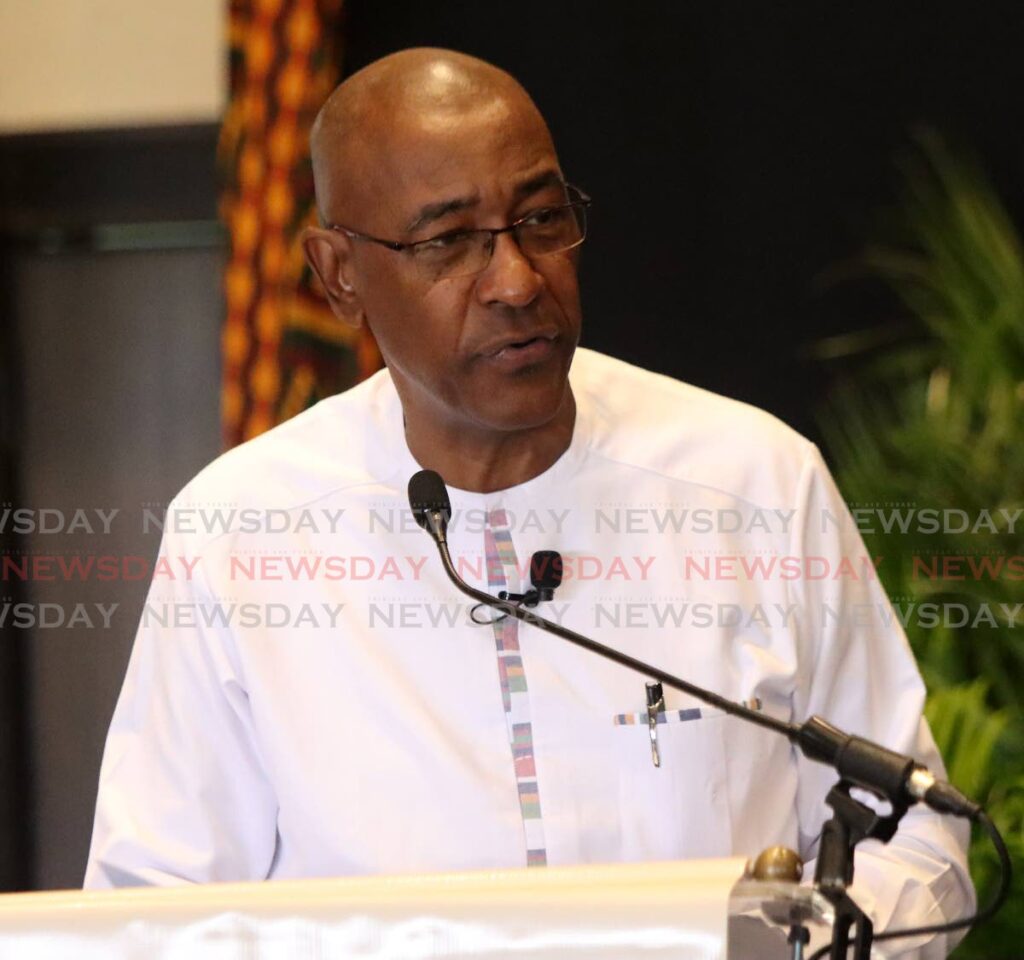Passage to Africa: Trinidad and Tobago, Ghana seek to strengthen trade ties

More than 400 years ago the Trans-Atlantic slave trade saw the transport of ten to 12 million Africans, to fuel the demand for labour that powered the sugar, cocoa, and tobacco plantations of the 16th to 19th centuries.
The passage from Africa, during which millions died, was taken by sail boats, which took weeks from the western coast of Africa to the West Indies, United States and Latin America.
Back then it was seen as "profitable" to have a direct route from the west to Africa. However, today at a time when resource-rich, economically booming Africa is reaching out to the world, including TT to do business and connect with non-traditional trade partners, officials at Caribbean Airlines explain that it is too difficult and not feasible for travel to Africa by plane.
However, their explanation was not satisfactory to a visiting Ghanaian delegation, in TT for Emancipation Day celebrations this week, who said while it would not be an easy task, there must be deliberation on how to remove the bottlenecks and rebuild that passage to Africa, for the growth of both regions.
CAL: Travel to Africa costly
On Monday at the 21st annual Trans-Atlantic Trade and Investment symposium held at the Hilton Trinidad, Aylette Wright-Paul and Herbert Ghent of Caribbean Airlines (CAL) explained that demand for flights to Ghana and other African states, as well as a capacity to accommodate flights were among the main challenges to establishing a direct route to the continent.
“In order to make the appropriate decisions you need to have that market data,” Wright-Paul said. “We did a brief fact-check before we came here and the market data for 2019 which would have been pre-pandemic, they indicated 61 people moving between TT and Ghana for that year.”
“Our fleets are complimented by Boeing 737 Max 8s, so in terms of range, yes, they are able to cross the Atlantic, but can they do it with people on board? So, we may be looking at a different type of aircraft which is not in our fleet.”
The 737 Max 8s have a maximum flight range of 3,550 nautical miles while the distance from TT to Ghana is 3,923 nautical miles. Some of the planes that are capable of trans-Atlantic travel are the Boeing A330-200, listed for US$238 million, and US$241.7 million for the freighter versions. On the more expensive side the Boeing Max 777-8 costs US$410.2 million. The 777-9 cost around US$442 million.
Business Day spoke to several travel agents who said from an airline’s perspective, to make any money out of using aircraft such as the A330-200, flights would have to be at a minimum of 85 per cent capacity for every flight.
Responding to the data of the level of demand for flights to Ghana, Trade and Industry Minister Paula Gopee-Scoon said the demand is greater from a regional perspective. She said numbers on movement from the Caribbean to Ghana for the same period was more to the tune of 250 people.
Nana Otuo Siriobe, the Omahene or king of the Juaben traditional area, lamented that a direct route was one of the main barriers to trade between TT and Ghana.
He described the lack of communication with a Ghanaian proverb.
“This is two fishes locked together with one stomach, but when they are eating, they struggle among themselves because of greed and avarice,” he said.
“I see the same thing with these two sitting behind me,” he continued, pointing to where Wright-Paul and Ghent sat. “Are we not the same people? So why should we divide ourselves.”
“If 400 years ago they were able to do this, then surely we can now also take a hard look at the challenges that separate us and make the necessary investments to achieve mutual benefits, this time not at the expense of one another but for our collective good.”
The middle passage
Siriboe said travel between Africa and the Caribbean is bogged down by lengthy journeys across the northern Atlantic with stops and transfers in the US and Europe which impedes connection between Africa and the Caribbean.
Travel agents told Business Day that it costs anywhere between $15,000 and $25,000 to travel to Ghana by air. The shortest route to Ghana from TT would be north to New York which takes five hours, then another flight to Ghana, which takes an average of 11 hours.
That is, if you have a visa. If you don’t, it’s much harder and more expensive.

Business Day was told that to get to Ghana without a visa, people would have to take a flight to the UK – a ten-hour flight, then from UK to Ghana which is five hours. People can also take a direct flight to Amsterdam which takes about ten hours, and then to Ghana, which would take another six-and-a-half hours.
The price of the flights are heavily dependent on the availability of the flights at the time of booking.
“I might sell you a fare into Accra, Ghana for about $12,000 today, and the person would say that they had only booked a week ago and the price is now $26,000 because only the highest economy is available.”
It would also depend on the availability of the connecting flights. Travel agents said if the connecting flights are not available people simply would not be able to go.
The same challenges affect freight, Business Day understands.
To get goods from TT to Africa would take five days of air freight on a good connection, going from TT to Miami, then Miami to London and London to South Africa and other places on the continent.
This is a key contributing factor to the level of exports made between the regions. Gopee-Scoon said at the symposium that Caribbean exports to Africa, despite its growth over the years, only account for three per cent of the region’s exports.
“These are heavily dominated by energy products from TT,” Gopee-Scoon said.
She added that TT’s exports are valued at US$769 million, with Ghana, Morocco, Senegal, South Africa being the main destinations.
Africa on the other hand exported US$290 million in 2022, with the top exporters being Nigeria, South Africa, and Angola to TT.
Africa – the land of opportunity
Gopee-Scoon added that the economic potential for Caricom through deeper integration with Africa is worth its weight in gold.
Citing data from the International Trade Centre (ITC), she said there is an estimated billion-dollar potential in sectors ranging from agri-food and healthcare, to tourism, fertilisers, and automobiles.
“The ITC indicated that addressing trade barriers and channelling investments into sectors with growth potential, Africa could increase its merchandise exports to the Caribbean by US$171 million by 2026,” she said. “The Caribbean in turn could boost its goods exports to Africa by US$80 million."
CEO of the Ghana Investment Promotion Centre, Reginald Yofi Grant said Africa has no less than 40 per cent of the world’s resources, including 90 per cent of the world’s platinum, cobalt, and chromium as well as a significant proportion of the world’s lithium, copper, iron ore, bauxite and other materials needed as inputs for various items for the transition to clean energy.
Lithium, for example, is a main component in the manufacture of batteries for electric cars, cellphones and other items. Chromium is also used for clean-energy generation.
“About 50 per cent of the world’s gold is in Africa,” Grant said. “Ghana is the number-one producer of gold in Africa. More than 65 per cent of the remaining arable land in the world is in Africa. So we can feed the world with our resources.”
“We can feed the world with our food. We are in the position of being the breadbasket of the world.”
He also said the future market will be African, pointing out that by 2050 the population in Africa will grow to 2.6 billion.
“By 2050 every fourth person will be African,” he said.
Former government minister Robert Le Hunte, who as a banker took Republic Bank to Ghana in 2010, said the attractiveness of the market in Ghana is the same today as it was back then, but people cannot sit on their hands and decide from TT. For people to see the opportunities in Africa, Le Hunte said, they would have to get up and go there.
“We saw the opportunity; we went on trade missions ourselves. We explored the market. We did the research. We did the analysis. We made the contacts. You cannot want to take advantage of the Ghanaian market by sitting in TT.”
In 2010, Le Hunte went to Ghana to begin facilitating the acquisition of HFC Ghana, completing the acquisition in 2013. The bank has grown six-fold since the acquisition.
Le Hunte, now at the Inter-American Development Bank, added as far as ease of doing business is concerned it is not much different from TT, with Ghana ranking 59 and TT ranking 61.
“No one is going to make it attractive for you,” he said. “For it to happen we need to go and make it happen. For airlines it is very expensive to set up a route, and if it is not financially feasible, who is going to subsidise the flights? Who is going to turn it to a business venture and make it successful? At the end of the day, it is all well and good to talk about it, Republic Bank didn’t talk, we went and did it. And we were successful.”

Comments
"Passage to Africa: Trinidad and Tobago, Ghana seek to strengthen trade ties"